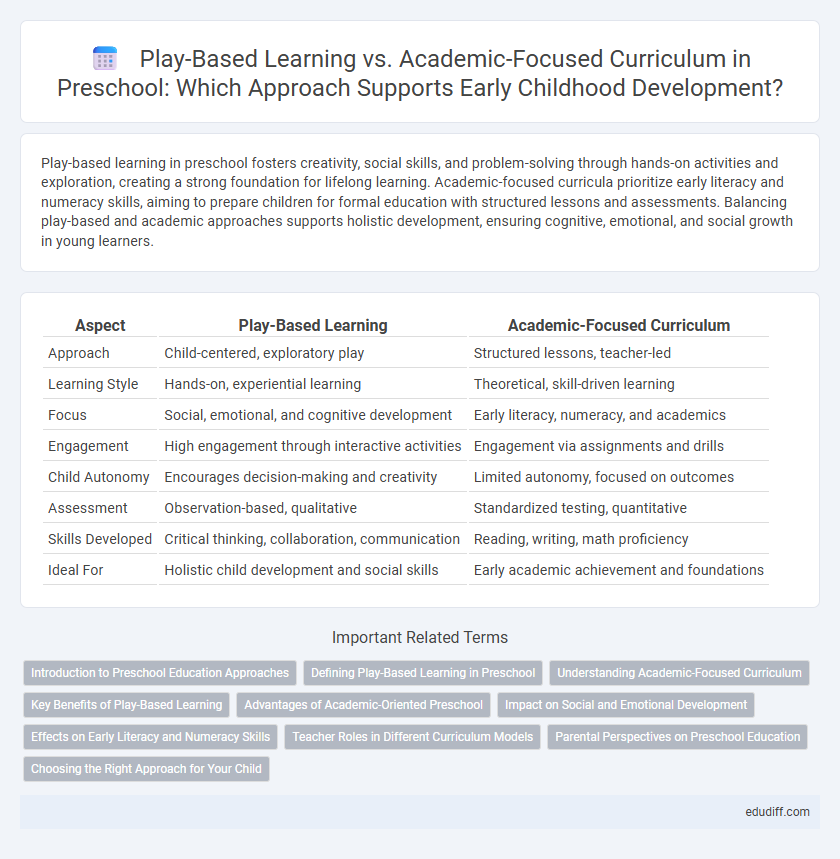Play-based learning in preschool fosters creativity, social skills, and problem-solving through hands-on activities and exploration, creating a strong foundation for lifelong learning. Academic-focused curricula prioritize early literacy and numeracy skills, aiming to prepare children for formal education with structured lessons and assessments. Balancing play-based and academic approaches supports holistic development, ensuring cognitive, emotional, and social growth in young learners.
Table of Comparison
| Aspect | Play-Based Learning | Academic-Focused Curriculum |
|---|---|---|
| Approach | Child-centered, exploratory play | Structured lessons, teacher-led |
| Learning Style | Hands-on, experiential learning | Theoretical, skill-driven learning |
| Focus | Social, emotional, and cognitive development | Early literacy, numeracy, and academics |
| Engagement | High engagement through interactive activities | Engagement via assignments and drills |
| Child Autonomy | Encourages decision-making and creativity | Limited autonomy, focused on outcomes |
| Assessment | Observation-based, qualitative | Standardized testing, quantitative |
| Skills Developed | Critical thinking, collaboration, communication | Reading, writing, math proficiency |
| Ideal For | Holistic child development and social skills | Early academic achievement and foundations |
Introduction to Preschool Education Approaches
Play-based learning in preschool emphasizes hands-on exploration, creativity, and social development, allowing children to build critical cognitive and emotional skills through interactive experiences. Academic-focused curricula prioritize structured instruction in literacy, numeracy, and foundational knowledge to prepare children for formal schooling. Both approaches serve distinct developmental goals, influencing cognitive growth, engagement levels, and readiness for future educational demands.
Defining Play-Based Learning in Preschool
Play-based learning in preschool emphasizes child-led activities where exploration and creativity drive cognitive development, fostering social skills and critical thinking through hands-on experiences. This approach contrasts with academic-focused curricula that prioritize structured lessons and early mastery of literacy and numeracy skills. Research shows that play-based learning supports holistic development, enhancing emotional and physical growth while laying a foundation for lifelong learning.
Understanding Academic-Focused Curriculum
Academic-focused curriculum in preschool emphasizes structured learning activities designed to develop foundational literacy, numeracy, and cognitive skills through direct instruction and assessment. This approach prioritizes measurable progress in areas such as letter recognition, counting, and problem-solving, aligning with early education standards and preparing children for formal schooling. Research indicates that clear academic goals and teacher-guided learning experiences in preschool can enhance early academic achievement and readiness for subsequent grade levels.
Key Benefits of Play-Based Learning
Play-based learning in preschool fosters cognitive, social, and emotional development by engaging children in hands-on activities that promote critical thinking and creativity. This approach enhances language skills and problem-solving abilities through exploration and interaction, contrasting with the rigid structure of academic-focused curricula. Research shows that play-based learning supports long-term academic success and overall well-being by encouraging intrinsic motivation and a positive attitude toward learning.
Advantages of Academic-Oriented Preschool
Academic-oriented preschools foster early literacy and numeracy skills, which improve school readiness and long-term academic performance. Structured learning environments in academic-focused curriculums promote discipline, focus, and cognitive development by introducing foundational concepts such as letter recognition, counting, and problem-solving. Research indicates that children in academic-oriented preschools demonstrate higher achievement in standardized assessments compared to peers in purely play-based programs.
Impact on Social and Emotional Development
Play-based learning fosters social skills such as cooperation, empathy, and conflict resolution by encouraging group interaction and imaginative play. Academic-focused curricula often emphasize individual achievement and structured tasks, which can limit opportunities for spontaneous social engagement and emotional expression. Research shows children in play-based environments exhibit stronger emotional regulation and social competence compared to those in strictly academic settings.
Effects on Early Literacy and Numeracy Skills
Play-based learning enhances early literacy and numeracy by fostering creativity, problem-solving, and social interaction, which support cognitive development and language acquisition. Academic-focused curricula emphasize structured skill-building through repetition and direct instruction, often leading to faster recognition of letters and numbers but may limit opportunities for imaginative exploration. Research indicates that integrating play-based methods with targeted academic goals yields the most effective outcomes in early literacy and numeracy skill development.
Teacher Roles in Different Curriculum Models
In play-based learning, teachers serve as facilitators who guide children's exploration and foster creativity by providing open-ended materials and responsive interactions. In contrast, academic-focused curriculum models position teachers as instructors delivering structured lessons, emphasizing direct instruction and skill mastery in literacy and numeracy. The efficacy of each approach relies heavily on the teacher's ability to adapt their role to support developmental goals and individual learning needs within their curriculum framework.
Parental Perspectives on Preschool Education
Parents often prefer play-based learning as it supports social, emotional, and cognitive development through hands-on activities and imaginative play. Academic-focused curricula are valued by parents seeking early mastery of literacy and numeracy skills, aiming to prepare children for formal schooling. Surveys indicate a growing trend among parents favoring balanced approaches that combine structured academics with playful, child-centered experiences in preschool settings.
Choosing the Right Approach for Your Child
Play-based learning fosters creativity, social skills, and emotional development through hands-on activities, ideal for children who benefit from exploring at their own pace. Academic-focused curricula emphasize early literacy, numeracy, and structured skill-building, suitable for children who thrive in goal-oriented environments. Assessing your child's temperament, learning style, and developmental needs ensures the selection of an approach that promotes engagement and holistic growth.
Play-based learning vs Academic-focused curriculum Infographic

 edudiff.com
edudiff.com